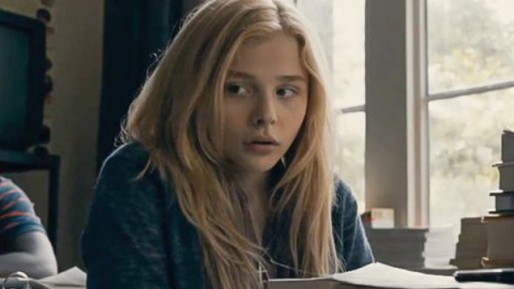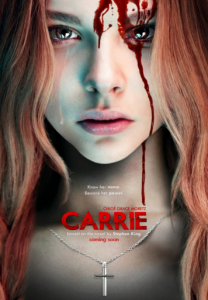Remakes of classic films are usually not worth the price of admission. I am constantly annoyed about how rampant unoriginality is in Hollywood. Why create something new and exciting when there are decades of movies to remake or reinterpret? That attitude has produced a litany of bad remakes. Carrie does not quite qualify as that level of remake, but I find it entirely unnecessary as a movie. That said, it’s not a bad film at all. In fact, it’s watchable because it emulates the original movie so much. I don’t know who that compliments more — Stephen King or Brian De Palma — but if you take the safe approach to a film, this is the way to do it. Carrie stars one of the best young actresses and updates the plot to today’s technology and music for a workable but flawed remake.
For those of you who somehow managed to miss King’s first novel or the two adaptations that already exist, Carrie centers on a teenage girl who develops telekinetic powers when she comes of age and ultimately uses them in various ways to deal with the people who persecute her. Director Kimberly Peirce was also the cowriter/director of Boys Don’t Cry and Stop-Loss. The script is credited to Lawrence D. Cohen (the original Carrie, It, The Tommyknockers and other King adaptations) and Roberto Aguirre-Sacasa (Big Love and Glee). I see the latter writer’s influence because the film takes place largely among high school students and all of the stereotypes are there in force as you would see on a show like Glee.
Carrie White (Chloë Grace Moretz) discovers her powers when she has her first period in the shower at school and all of her fellow students ridicule her because she has no idea what’s going on. This scene plays almost exactly like the original with the other girls throwing tampons and telling Carrie to “plug it up,” but the element that makes you realize that it’s a modern film is that queen bitch Chris Hargensen (Portia Doubleday) captures the persecution on her cell phone and posts the video online. Fellow student Sue Snell (Gabriella Wilde) shows compassion for Carrie later on, and gym coach Ms. Desjardin (Judy Greer) comes to Carrie’s rescue. The main cast only involves a few more actors. Julianne Moore plays Margaret White, Carrie’s holy roller of a mother who makes all of Carrie’s clothes from scratch and blasts inspirational music by Tennessee Ernie Ford. Tommy Ross (Ansel Elgort) is Sue’s boyfriend and the kind guy who invites Carrie to the prom at Sue’s behest. Billy Nolan (Alex Russell here and, notably, John Travolta in the original) is Chris’s boyfriend and her accomplice in one of the most horrendous high school pranks of all time. For fans of Barry Shabaka Henley — count me as one of them — he has just a few scenes as Principal Morton.
When I heard that Moretz was cast as the lead in this remake, I had high hopes for the film, especially when Moore was announced as Carrie’s mother. These are two of my favorite actresses in iconic roles, and I was at least curious how they would handle the challenge. Moretz almost pulls it off, but she’s too pretty for the part and not at all awkward no matter how hard she tries. Her hair color is a really bad red-blonde combo, and it just looks weird. Moretz previously appeared in Let Me In, an inferior remake of an outstanding original film, so she should really stop with the remakes for a while. Moore almost never disappoints, and this is no exception. She’s creepy and disturbing, especially with her self-mutilation, so I was at least half-satisfied by the lead performances. The teen actors and actresses are good for the throwaway roles, so the only other standout for me is Greer. She has all of the pluck and concern that you want in a teacher. Did there really need to be a clichéd scene of her dancing awkwardly at the prom?
This Carrie is much bloodier than the original in incidental scenes as well as the famous bloody prom scene. Makeup effects have advanced so much over the decades that it’s much easier to have Moore poke and prod at her skin and other characters withstand brutal damage. Carrie goes overboard in terms of physical special effects. When things go out of control in the finale, there are lots of flames and explosions to accompany the blood and screaming prom attendees. Peirce made one major change to Carrie’s actions that caused me to cringe. Sissy Spacek did a lot in the original film with a simple stare or tilt of her head. Moretz waves her hands to unleash her powers as if she were in a Harry Potter film. I found that to be annoying instead of just another interpretation of the character.
As a huge King fan, I’m all for adaptations of his work as long as they tread new ground instead of rehashing the same ideas. The enormous It is one of my favorite King books, and I’d welcome another miniseries because the first one just didn’t get the book right. This version of Carrie should be declared the last adaptation in a sort of gentleman’s agreement among filmmakers. It feels so much like De Palma’s work, even in scenes like the one at the farm with the pig. Perhaps that’s Cohen’s touch instead of De Palma’s. Similarly, Moretz has enough talent that she can find more original material that suits her like Hit-Girl in the Kick-Ass movies. I will lose faith in her, though, if I hear about her doing a remake of Firestarter. Peirce showed great promise with Boys Don’t Cry, and it’s kind of gone downhill from there. She can do better than a remake like Carrie that’s too familiar for its own good.




